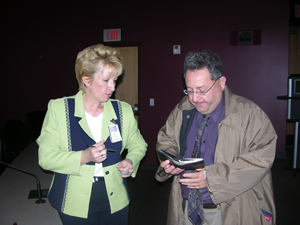 |
Sharon Medcalf of the Center for Biopreparedness Education, talks with Hani Haider, Ph.D., UNMC associate professor of orthopedic surgery, following the Nov. 7 forum. |
The second forum will be held the College of Nursing’s Cooper Auditorium this evening at 7 p.m.
Medcalf is associate director of the Center for Biopreparedness Education. She travels the state educating people on how to be prepared during disasters. Her talks now focus mostly on avian flu, more commonly called “bird flu.”
The center, funded by the Centers for Disease Control and Prevention (CDC) and the Health Resources and Services Administration (HRSA), is a joint endeavor of UNMC and Creighton University Medical Center.
“You could dwell on all the info about bird flu (H5N1), but we don’t know how deadly it will be until it becomes a pandemic. That won’t happen until the virus mutates and becomes easily transmissible from human-to-human. There are so many things we don’t know until it begins,” Medcalf said.
“We’re tasked with educating responders for any disaster, whether intentional or unintentional,” Medcalf said. “We’re very involved with educating anyone who wants it.”
She’s made her bird flu pandemic presentation more than 100 times since the center was formed in 2002. She has presented at forums, church groups, professional organizations, associations, business and civic organizations and even at junior high schools.
What are some of the most common questions she gets?
“We suspect we will see H5N1 this fall or winter in birds. It always sparks questions from hunters. Backyard bird feeders could be high risk for humans trying to clean out the feeders because birds carrying the virus can shed the virus in their feces and saliva. It’s not going to be good to power spray the bird feeder,” Medcalf said. “I advise people to perhaps consider not using their bird feeders once the experts have detected the virus in our migratory birds.
|
|
She talks about what individuals can do to prepare themselves and their families.
“This is going to be a local issue and we all need to take responsibility for preparing ourselves. (U.S. Secretary of Health and Human Services Mike Leavitt) traveled the country in early 2006 and told families they needed to have four to six weeks of food in their houses,” Medcalf said. “What we can provide is the 16-week household stockpiling tool, which basically says here’s what you buy, so at the end of that time you have enough stockpiled to get you by. People really appreciate that.”
Medcalf said businesses should expect 40 percent absenteeism.
“I get them to think about how they can figure out how to continue their operation using public health measures, such as keeping people more than 6 feet apart,” Medcalf said. “I plant seeds about considering alternating shifts, using every other work cubicle, working from home, things like that.”
Stockpiling anti-virals, vaccine and other products is also a discussion.
“There are going to be scarce resources. How will we prioritize these resources? Who’s going to be first in line? It’s all going to be decided at a local level, including how many police, fire, food producers and distributors, clergy . each community has to decide who will be responsible. They’re all highly ethically charged discussions and decisions. It really hits home with people,” Medcalf said.
In her talks she tries to install concern.
“I want people to act . think about stockpiling, the workplace and how things can be adapted. But I don’t want to have them panic either. The planning is a win-win because if it’s not a pandemic that happens, it could be a new outbreak, but at least we’ve taken the time to establish something like this for a communicable disease,” Medcalf said. “We’ve never had the time before bur now we have.”
Medcalf said she also is preparing at home.
“I’m on week 10 of the 16-week plan,” Medcalf said.
The 16-week supply plan can be found at www.unmc.edu/avianflu.